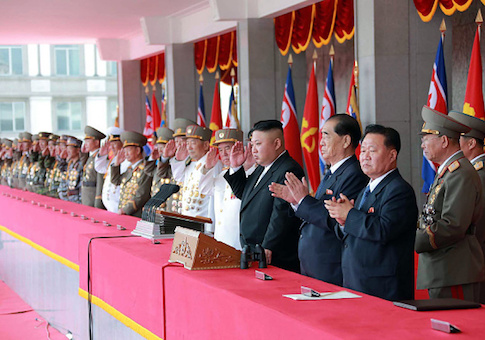Singapore—Elites in North Korea increasingly disapprove of the Kim Jong Un regime, according to a report released by the RAND corporation.
The April 27 report found many elites regard his rule as ineffective and question the legitimacy of his succession to the supreme leadership position after the death of his father, Kim Jong Il.
RAND, a US military-funded think tank, conducted interviews with a number of North Korean defectors in order to determine how the elite classes in the country view the current regime and how they see prospects for eventual unification with South Korea.
Elites have been unnerved by the number of officials that have been purged since Kim Jong Un took power.
The current ruler assassinated his half-brother Kim Jong Nam at the Kuala Lumpur Airport in Malaysia in February 2017. The murder eliminated the possibility that the upper ranks of the ruling Korean Worker's Party would promote the late half-brother as an alternative to Kim Jong Un.
North Korea's founding principles contain "no provision for dynastic succession," according to the report. Kim Jong Un is the third generation of a communist "monarchy" that has kept the Kim family running the country since its founding.
Nevertheless, according to the RAND study, as well as the observations of North Korea-watchers based in Beijing, elites in the North Korea fear their future prospects in a united Korea under the Seoul government more than they do the erratic nature of Kim’s rule.
Some analysts based in Beijing believe the current interpretation that elites would take action to remove Kim Jong Un to avoid a war with the United States is "wishful thinking." "Many Chinese elites also hate President Xi Jinping, but that does not mean they are going to try to remove him," said one specialist on North Korea.
"Lots of people in the DPRK are unhappy but what can all of those unhappy people do? The North Korean state’s control over peoples’ actions is even greater than it is in the [China]," said another analyst.
Some of the same analysts say the May 9 presidential election in South Korea is likely to be a lifeline to Kim Jong Un’s regime. In the latest polling, presidential front-runner Moon Jae-in has widened his lead over his next closest rival by almost 22 points and seems all but assured of victory. Moon is expected to make a "post-election grand political gesture by proposing a face-to-face meeting with Kim Jong-un"—creating a new opening between the two divided Koreas.
Aside from potentially offering some economic relief to the impoverished North and possibly opposing additional sanctions against Pyongyang, Moon is also predicted to reject the plan for the United States to base the Lockheed Martin Theatre High-Altitude Air Defense (THAAD) system in South Korea. Both Kim and China's Xi oppose this advanced anti-ballistic missile defense capability being positioned on the Korean peninsula.
Without a U.S. military strike to take out North Korea's missile and nuclear weapons programs "the situation with the North stands a good chance of reverting back to what we have seen the past decade or more," said a NATO nation intelligence analyst specializing in North Korea and China.
